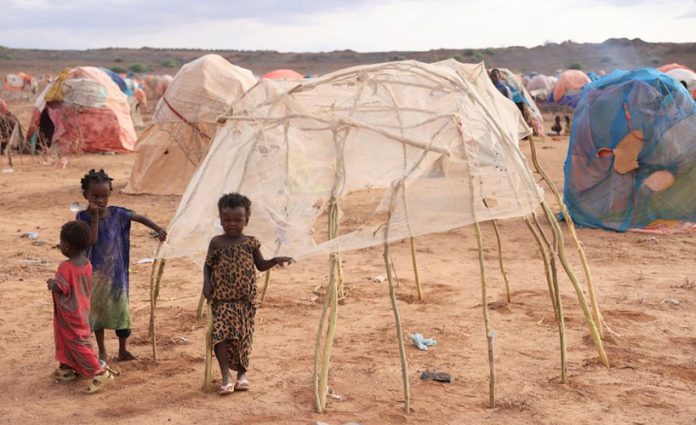The UN Under-Secretary-General for Humanitarian Affairs and Emergency Relief Co-ordinator, Martin Griffiths, has warned that two million children in East Africa are at risk of starving to death, as the region is in the grip of prolonged drought caused by changes in weather patterns.
At a donor conference to raise money for the crisis this week, Mr Griffiths said that the Horn of Africa faced “one of the worst climate-induced emergencies in its history. Once again, vulnerable people across the Horn of Africa are falling victim to the cruelty of acute hunger and potential famine in a crisis that is not of their own making. We must all step up and show the people of this region that we are here to help alleviate their suffering.”
In Somalia, 350,000 children below the age of five are at risk of dying of malnutrition and disease, and millions of people are facing hunger after three failed rainy seasons, and another looming.
This is a higher number of deaths than in the devastating famine of 2011, when a quarter of a million people died, half of them children.
The UN estimates that there are pockets of famine in the country already, and that more than one million people are already on the edge of survival.
Extended drought is fuelling a hunger crisis in East Africa: an estimated 7.2 million Ethiopians are already not getting enough to eat, and half a million people in Kenya are close to what the UN’s World Food Programme has described as “catastrophic levels of hunger and malnutrition”. In South Sudan, floods and insecurity are pushing a further eight million people towards hunger and malnutrition.
The hunger crisis has been aggravated by the war in Ukraine, which has driven up food prices: grain prices are up by 45 per cent, and 90 per cent of the region’s wheat imports come from Russia and Ukraine.
Aid agencies also fear that, while the world’s attention is on Ukraine, the crisis in Africa is unfolding almost unnoticed. Finn Church Aid, a Finnish NGO and a member of the global faith-based coalition Act Alliance, said that the crisis was man-made.
“This is another man-made crisis, just like Ukraine, except that the cause of the drought is climate change,” the executive director of Finn Church Aid, Jouni Hemberg, said. “Those who remember the famine in Ethiopia are haunted by it. This is a similar event across a larger scale, but we have means to prevent the suffering that the 1980s famine caused.”
The UK announced a £25-million aid package to Somalia, during the conference on the drought hosted by the EU and the UN Office for Humanitarian Affairs, which raised £1.1 billion in total.
The UK Minister for Africa, Vicky Ford, warned: “We should be in no doubt of what will happen if we fail to support the people of Somalia: 350,000 children will die, and many more will have their lives ruined.”
But Oxfam said that the UK Government’s pledge was far from enough. Oxfam GB’s chief impact officer, John Plastow, who recently visited drought-affected areas in Ethiopia and Kenya, said: “The additional £25 million pledged by the UK Government to Somalia is welcome, but is far from sufficient to help the 28 million people across East Africa who are facing severe hunger.
“With rains failing in parts of Ethiopia, Kenya, and Somalia for the fourth consecutive season, and South Sudan suffering a fifth year of severe flooding, Oxfam is calling on the UK Government to urgently provide at least £900 million to help avert widespread starvation and death across the region.
“We cannot wait until famine strikes; we must act now to help save lives and prevent further suffering.”












